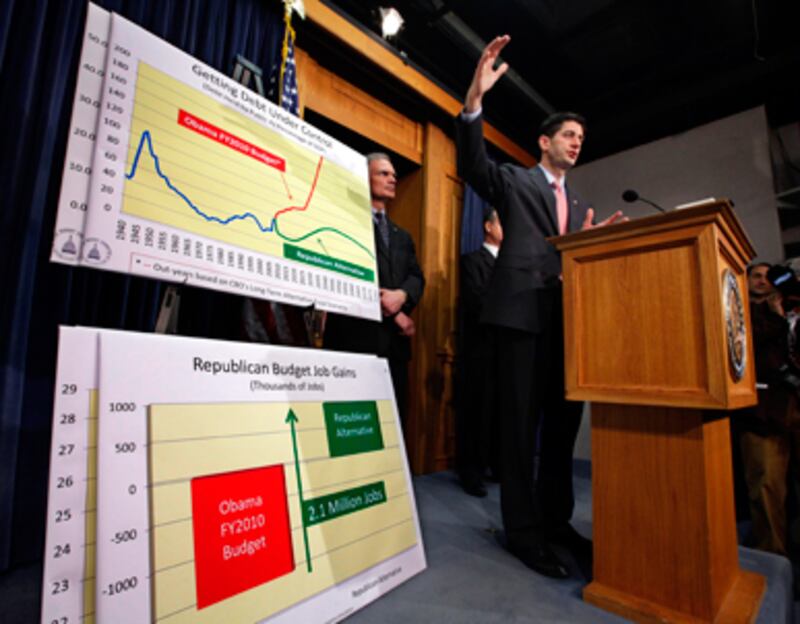Every few years, members of the majority party in Congress unite to cast a vote that breaks through the din of daily procedural motions and defines a congressional career, for better or worse. And it happened again Wednesday.
In 1993, the Democratic-controlled Congress voted to approve President Bill Clinton's budget, complete with a call for deficit reduction and a tax increase. Fifteen months later, Democrats lost control of the House and Senate and watched dozens of their colleagues pack up their offices and go home in defeat.
Under President George W. Bush, Senate Republicans followed their president's lead and voted to approve a controversial bill reforming the immigration system. The legislation failed to pass Congress, but ignited a furor among conservative voters across the country and cost Republicans crucial support in the 2006 and 2008 elections.
Three years later, the newly empowered Democratic majority in Congress pushed through President Obama's health-care reform bill over the loud objections of Republicans and even moderate Democrats. The dust settled in 2010 after the president's party lost 63 seats in the House and control of the chamber, as well as six seats in the Senate, with huge numbers of voters telling pollsters that the health-care vote convinced them to replace their congressman with someone new.
Now, less than six months into their majority status in the House, Republicans seem to have wandered into the same electoral quicksand that Democrats just hoisted themselves out of by taking on the historically toxic issue of entitlement reform. Rep. Paul Ryan's budget blueprint slashes domestic spending in an effort to shrink the ballooning federal deficit. As a part of that plan, Ryan replaces the current Medicare system with a plan to give future seniors money to purchase private health insurance on their own.
“If the House Republicans walked the plank on the Ryan plan, Senate Republicans just jumped off the cliff.”

In a blow to Republicans, the nonpartisan Congressional Budget Office estimated that, while Medicare is not sustainable in its current form, the Ryan plan would leave seniors paying nearly twice as much for health care—more than $12,510 a year—than they do under today's Medicare.
Although the Ryan plan sailed through the House last month with just a handful of defections, it failed in the Senate on Wednesday night, 40 to 57, with five Republicans joining the Democrats to reject it. Before the vote, Maine's Sen. Olympia Snowe said the Ryan bill would effectively privatize Medicare, a result she could not support.
Fellow Republican moderates Scott Brown of Massachusetts, Lisa Murkowski of Alaska, and Susan Collins, also of Maine, all voted against the bill, citing concerns about changes to Medicare. (Sen. Rand Paul, the conservative from Kentucky, said he voted no because the Ryan plan did not go far enough to rein in federal spending.) Forty Senate Republicans, including all of the party's leaders, voted in favor of the Ryan budget.
Democrats are hoping that Republicans' vote on the Ryan budget plan will be the vote that defines the debate for the 2012 elections. "If the House Republicans walked the plank on the Ryan plan, Senate Republicans just jumped off the cliff," a Democratic aide said after the vote.
The first test of the Democrats' strategy came this week in New York's 26th Congressional District, where Democrat Kathy Hochul snapped up a victory Tuesday in what should have been an easy win for Republicans in the conservative district. Democrats spent millions of dollars hammering the Republican, Jane Corwin, for her support of the Ryan budget plan. Days before the election, a Siena College poll showed Hochul with a 20-point advantage among senior voters in the district.
Convinced that Medicare had been the deciding factor in the New York race, Senate Majority Leader Harry Reid on Wednesday forced increasingly skittish Republican senators to vote on the Ryan plan, eager to put them on the record as supporting changes to Medicare.
Senate Republican Leader Mitch McConnell accused Reid of "political gamesmanship," but Reid said Republicans should welcome the chance to support Ryan's Medicare proposal.
"Our Republican colleagues should be eager to show the American people what they believe in," Reid said before the vote. "That's what that vote will be all about."
For his part, Rep. Ryan accused Democrats on Wednesday of trying to scare seniors about his plan, when no voters over 55 would be affected by his proposal. "It can be a powerful political weapon," Ryan told NBC News. "If you can scare seniors… it's demagoguery."
Buddy Darden, a Democrat from Georgia who lost his seat in 1994 after voting for several controversial bills during President Clinton's first two years, including the budget resolution, said Republicans are now facing the same struggle Democrats did in the first years of Clinton's term, when they suddenly had the power to change policies, not just talk about changing them.
"The House leadership, I think we can all agree, took a very foolhardy step in the Ryan budget and now they're looking for ways to retreat from it," Darden said. "It's so much easier to be against something than for something. But all of the sudden, they put their plan out there and they're finding out that it's not as easy as they've been telling people it would be."
But, he added, the GOP has time to recalibrate before 2012. "The House majority is fortunate to have received the shot across the bow that they got in New York," he said. "I think the story is yet to be written."
Patricia Murphy is a writer in Washington, D.C., where she covers Congress and politics.





